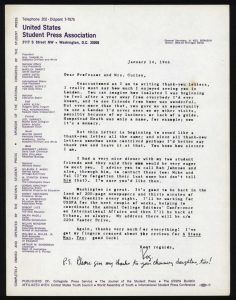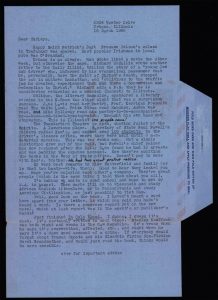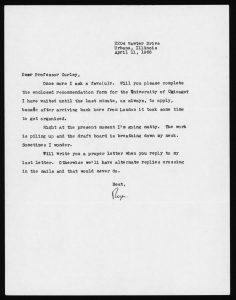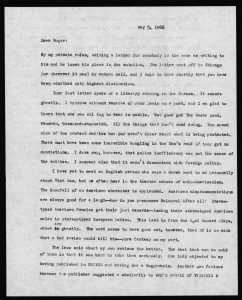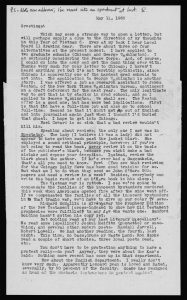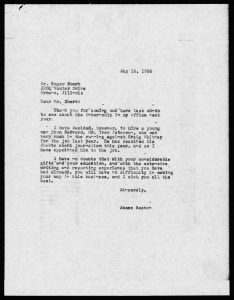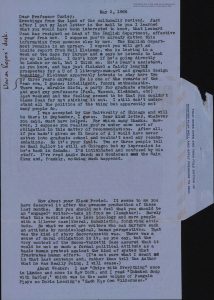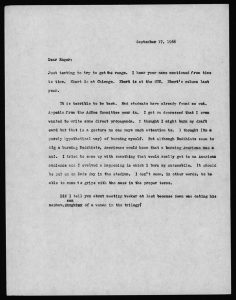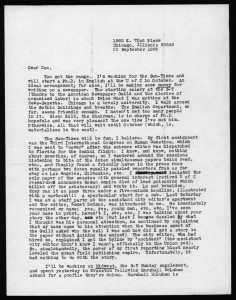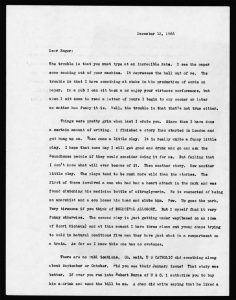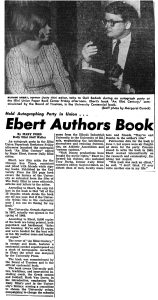For Roger, Dan Curley was not just an inspirational professor. As noted in Life Itself, “My early role models were my father and Dan Curley. He appeared in my life almost precisely when my father died. . . . Did he understand the need he began to fill?”
Roger’s letters illustrate what Curley supplied: the sounding board to explore new perspectives on culture, the courage to choose between a career in journalism or academia, and the means to navigate that black fog enveloping so many young men in the 1960s—the constant uncertainty of being drafted into military service.
The Ebert-Curley correspondence, however, does not just provide a picture of the hurdles Roger faced on the way to a successful career. It demonstrates how, for Roger, lifelong bonds evolved from his classroom experiences.
London Visit
On his way back from the University of Capetown, Roger stopped to visit Curley, then on sabbatical in London. Dan introduced Roger to Hampstead Heath, which later became the topic of a book they co-authored. The trip was a turning point. Formerly student and teacher, they now began the journey that made them lifelong friends, confidants, and collaborators.
This is Illinois?
This Aerogramme from Roger to Dan Curley describes recent literary events in Urbana-Champaign, the Secretary of State’s “raid” of Kams bar, and the opening of the Thunderbird movie theater (now the Canopy Club). Roger also comments on his graduate degree plans, includes his observations on Truman Capote’s In Cold Blood, and notes his worries about being reclassified I-A by the draft board.
Last Minute Favor
Roger’s request for a letter of recommendation from Curley to the University of Chicago repeats his worries about the draft board.
Some Kind of Paragon
Dan Curley’s effusive letter recommending Roger to graduate school at the University of Chicago.
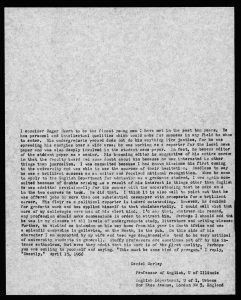 Enquiring about the Times
Enquiring about the Times
Seeking a job at The New York Times, Roger wrote a 4-page letter to Illinois alumnus James B. Reston, who was head of the Times’ Washington Bureau. The letter provides insights into the multi-dimensional dilemma he faced in 1964-66. Decisions about where to go with his life were all overshadowed by the high likelihood of the military draft, but he also was uncertain whether to pursue work as a journalist or as a professor of English.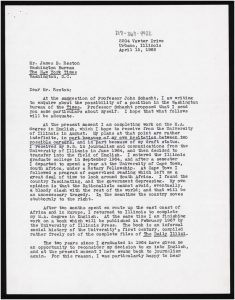
Literary Gatherings
Curley’s commentary on Roger’s updates of a campus literary gathering as well as the Kams raid shows how important sabbatical-period correspondence can be for documenting the nature of a university such as the University of Illinois. Note also Curley’s observations about the British reaction to Americans at this time, when the war in Vietnam was escalating.
Crawling with Movies
Roger updates Dan on English department affairs, comments on the Vietnam War, notes highlights of the Urbana-Champaign arts scene (“the place is absolutely crawling with movies”), and describes an internship offer from James B. Reston.
Reston’s Rejection
James B. Reston to Roger, saying he is hiring someone else because he could be more certain of that candidate’s career trajectory into journalism.
Two Dollars an Hour
An aerogramme (dated May 3 but presumably May 31) to Dan in London announces Roger’s admission to the University of Chicago. It also provides an update on matters inside the U of I English department, describes work for the News-Gazette, plans to apply at the Chicago Daily News, and having gotten work at the Chicago Sun-Times. In this same “Dear Professor” letter, Roger offers his mentor collegial support, when Curley was experiencing a dry period in his own writing.
Terrible To Be Back
Curley, having difficulty adjusting to being back on campus after the London sabbatical, begins by commenting on Roger’s progress in the Chicago journalism business.
Gothic Buildings
Roger confirms rumors of his early success at the Chicago Sun-Times and discusses academic life at the University of Chicago, including a wry observation on the inscrutability of social theorist Marshall McLuhan.
Typing at Incredible Rates
The Professor expresses jealousy at the ease with which his former student writes.
Illini Century
The Daily Illini account of a promotional book signing for Roger’s Illini Century, which provided an overview of a hundred years of student life. This, Roger’s first book, was produced for the University’s centennial celebration.
